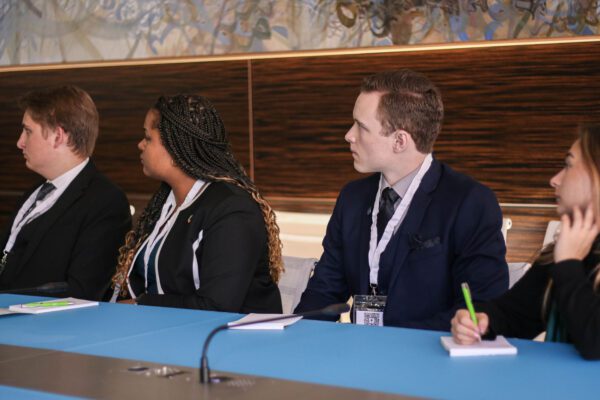On Sunday, November 3, IEUMUN 2024, the 5th edition of IE’s annual Model United Nations Conference occurred. As the biggest charity conference in Europe, this year’s edition brought together over 400 people from dozens of countries around Europe and the world. Featuring 11 different committees, the conference offered a wide range of topics, issues, and opportunities.
The conference began with the opening ceremony, a celebration of the hard work that went into staging the conference. With speeches from Campus Life, IE’s School of Politics, Economics, and Global Affairs (SPEGA), the Debate Club, and a myriad of other groups and individuals, the sheer amount of effort and teamwork required before the conference even began was evident. Then, the Secretary General of this year’s conference, Arianna López, banged the ceremonial gavel and proclaimed the conference to be open!
This year’s charitable beneficiary was “Acción por la Música”, a foundation based in Madrid aiming to promote social inclusion through the teaching of music. Focusing on less-well-off areas, the foundation combats poverty, social and cultural barriers, and a host of other issues through a variety of music-related activities and the resulting formation of networks, skills, and bonds. During the opening ceremony, delegates were treated to a speech from Acción por la Música’s president and founder Maria Guerrero Sanz, in addition to a number of musical pieces played by some of the foundation’s members.

The Acción por la Música Orchestra plays during the Opening Ceremony (Sophie Besland, 2024)
As with each edition of the conference, the organizing Secretariat decided on a topic upon which to focus this year’s conference. As such, this year’s theme was “Cooperation in a Deglobalizing World” which led to many committees dealing with topics addressing large, global issues through delegate collaboration. Like most MUN conferences, each MUN committee is based on a real body of the UN, and delegates are assigned a country whose position they have to defend during a debate about a given topic. For example, the Special Political and Decolonization Committee worked to address the situation in Somaliland, and the United Nations Office on Drugs and Crime Committee aimed to assess the efficacy and impact of decriminalization policies on drugs.
However, beyond the topics, the design of committees also incentivized collaboration among delegates. The NATO Committee required all its 25 delegates to unanimously agree on its final resolution, with even one vote against vetoing the entire committee. Furthermore, in the quad-cameral Crisis Committee regarding the Warring States Period of ancient China, with four separate committees working against and with one another, collaboration was essential. Crisis Committees, a niche subsection of the MUN world, deal with special and specific issues, where delegates often represent a character instead of a country, and use actions to help themselves succeed both in their committee but also in the larger Crisis.
Outside of delegate’s very busy lives in committee, the conference also offered a host of activities for delegates to expand their experience further. Delegates were able to participate in a masquerade gala at the Reina Sofía Museum, in addition to other social and networking events. Moreso, some committees were able to visit locations related to their topics, such as the headquarters of UNICEF in Spain, the Casa Arabe, or CESEDEN, a center for national security studies of the Spanish Armed Forces. Aside from visits, some committees also benefited from talks led by highly qualified speakers who ranged from IE faculty to famed journalists and acclaimed virologists.

Delegates watch on and take notes during a visit to CESEDEN (Jorge Blazquez, 2024)
After 4 long days of hard work both inside and outside of the committee, the best and brightest delegates from each committee were recognized with awards during the closing ceremony. In addition to individual delegates, delegations sent from other universities were also recognized for their achievements, with the delegation from the Hult International Business School in the UK taking the prestigious Best Delegation Award.
Overall, IEUMUN 2024 proved itself yet again as one of Europe’s premier MUN conferences, expanding on last year’s successes and correcting its mistakes. Already, delegates and organizers alike are eager for next year’s edition, ready to find out committees, topics, and assignments with a hunger for collaboration and togetherness, all brought together by the hard work of IEUMUN’s organizers, staff, delegates, and, of course, IE University itself. With this year’s edition closed, its participants are often left with a bittersweet feeling of this amazing experience ending, but as their eyes turn towards the future, anticipation for IEUMUN 2025 is building.
Featured image: IEUMUN’s Secretary General, Arianna López, proclaims the conference open (Sophie Besland, 2024)




